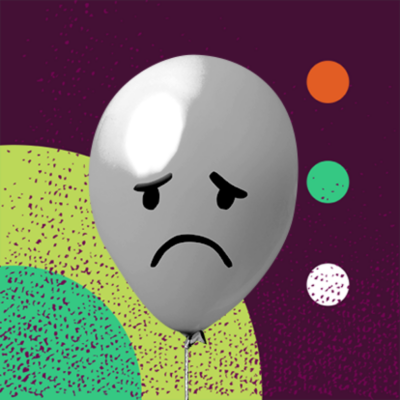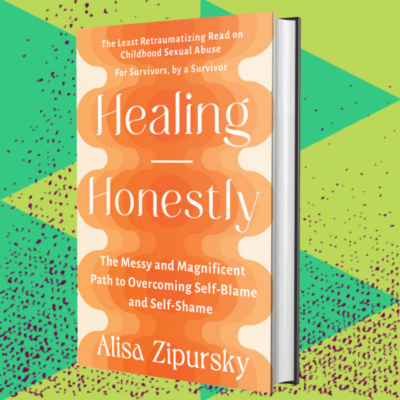This story contains discussion of the emotional impacts of child sexual abuse, but no descriptions of the physical abuse.
I’ve been thinking a lot about grief and healing from childhood sexual abuse, especially for those of us who’ve dealt with challenges around our traumatic memory.
I’ve spent the last year deep in supporting fellow childhood sexual abuse survivors via my coaching work, and I’ve come to see grief like a nosy neighbor who stops by uninvited in each of my coaching sessions. Time and again, I observe survivors feeling relieved to be in community with other open survivors, often for the first time in their lives, but that relief quickly gets muddled with a deep sense of grief. The unannounced arrival of grief often leaves people feeling disoriented, justifiably frustrated (isn’t healing supposed to feel good?!) and exhausted. And if grief is one thing, it is fucking exhausting.
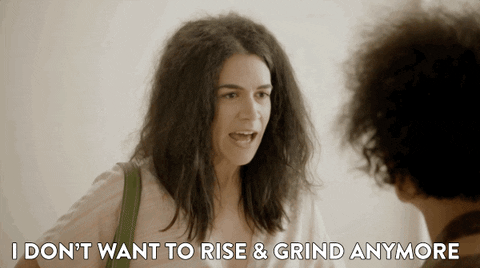
This pattern of grief’s arrival happens so often that it’s made me reflect a lot about my own relationship to grief and why it is such a present aspect of healing for so many of us.
Why the grief can show up for us in adulthood
Grief has been a familiar friend in my healing, as it was the death of one of my parents that became the initial trigger for my previously dormant CSA (which I’ve written about here).
But there’s another aspect of how grief can show up for us, especially when we’ve been actively working on our healing, and this is how I make sense of it. (There are going to be generalizations below, and I understand if the plural language I use doesn’t connect with you):
As CSA survivors, we’ve spent the vast majority of our lives being denied the reality of our trauma. We were gaslit by our families and communities to believe that the harm we experienced and the resulting pain either weren’t that bad, didn’t matter, or, perhaps, never existed at all. For those of us without clear memories of what happened to us—myself included— there is an additional layer of the world around us denying our truth.
We never had the opportunity to grieve what we went through as children because we were too busy trying to survive and navigate all the pressures from the adults in our lives to not be “difficult,” “dramatic” or too demanding. We didn’t have the space to process how awful everything we endured really was for us. We also likely didn’t have adults validating or affirming that the pain we felt in our souls was worthy of grief. And for some of us without memory, we couldn’t grieve because we couldn’t even understand what happened to us in the first place.
To put it far too simply: we couldn’t grieve; we had to keep shit together.
So to me, it makes sense that, as adults, when we find ourselves in a space where our pain and trauma are validated, possibly for the first time in our lives, we may be smacked right in the face with a pie plate full of sticky, messy, overwhelming grief.
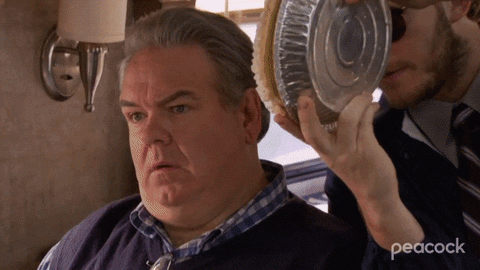
If we accept validation from others and from ourselves, that we actually were sexually abused as children, then it means that this horrifying thing really did happen to us and we never deserved it. And so we grieve. We feel depression, heartbreak and/or furious rage, sometimes for the first time ever, because we finally have the space, support and safety to process how awful it was and mourn for the child who should’ve never had to endure what they did.
I’ve noticed that when I feel the grief of my CSA, I find myself thinking a lot about my child-self and what Kid-Alisa must’ve been navigating. I think about how alone and ashamed she must’ve felt and I feel furious on behalf of her. When I tap into that grief, my lack of memory isn’t really a source of invalidation, but rather, I feel struck by how terrible it must’ve been for Kid-Alisa that her brain had to repress whole years of her childhood just to keep going.
Why I think it’s good grief
Okay, I know what you’re thinking. You’re shouting at me that this grief is exhausting and so painful and you’re already mad at me as you anticipate my positive spin on grief. I get it. You don’t have to love or celebrate your grief; I’m just going to give you my own understanding of grief and if it connects with you, great; if not, that’s okay too! Just know that I’m not a silver-linings person; I live by a general rule-of-thumb that silver-lining interpretations of terrible experiences are totally bullshit, toxic positivity nonsense. But you know, to each their own.
With all that said, I genuinely think my grief has been a good thing and I’ve seen it be a good thing in some other survivors too.
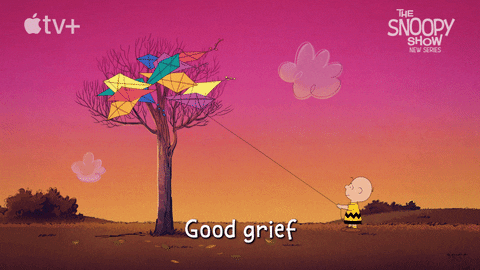
Here’s my hot take: Grief, like anger, is a kind of cool and important experience in healing because, in order to feel those emotions, it necessarily means we are accepting that what happened to us was real, wasn’t our fault, and never should have happened.
I can imagine a non-survivor reading my take above and being like, “Uhhh, duh it wasn’t child-you’s fault that you were sexually abused.” But for survivors, we know that embodying the above statement is fucking tricky and, for a bunch of us, accepting that our abuse was real and not our fault is the hardest part of healing.
Grief is not available to us unless something inside of us is acknowledging and accepting that our abuse was real and that the shame we were conditioned to feel was part of the abuse and also wrong. I think of grief as coming to us when we are finally able to stop trying to keep everything together in order to survive and we can begin to exhale all we’ve been carrying with us. I recognize that, while it shouldn’t be, that exhalation is a privilege. Some survivors are forced, by no fault of their own, to spend their whole lives in survival mode because of the compounded impacts of oppression.
I know it’s easy for me to say to you, in your horrible hours of grief, “Look! You’re healing!” But I do truly think that grieving is what part of healing looks like for so many of us. I promise not all healing involves ugly crying, exhaustion and physically feeling your heart ache. Healing is also full of joy and light; it’s just that this article is devoted to the Kleenex-heavy aspects of our healing.
All these dope, cool things become available to us when we no longer carry around the shame that was never ours to hold. We can begin to accept that we are not wrong, but rather something very wrong happened to us. And accepting that truth means we feel the weight of how fucking wrong it all really was. In my experience, that weight does not stay with us forever; like all grief, it changes over time.
When grief shows up during the good times
Something I’ve noticed with my own grief the past year is that it’s been showing up for me at seemingly good times in my healing.
I’ve noticed my old friend Grief return when I’ve made big achievements with Healing Honestly, when I’ve had an amazing coaching session with a survivor, and when I received support and validation from an important person from my childhood. It’s felt disorienting because I associate grief with sadness and pain, not with these seemingly positive developments. Even the best possible news about my work can inspire my grief to return.
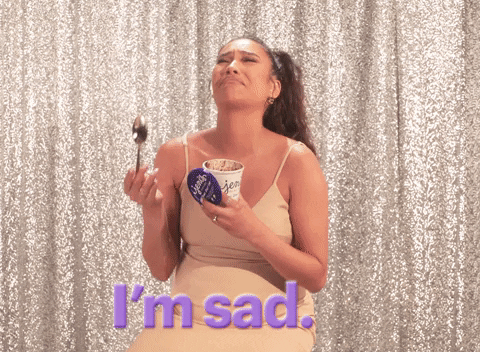
I consider what I’ve observed from survivors I work with and how validation can sometimes trigger grief. It reminds me that all these “advancements” in my healing/work have brought me even further down the road of feeling fully affirmed and validated in my identity as someone who survived childhood sexual abuse. As I continue down that path, each step is a reminder of my dear friend Grief and a mourning for what my child-self had endured. I realize that I’m not done grieving what she survived.
I don’t mean to say that my work doesn’t bring me immense pride, excitement and purpose. It does all those things. I am not a martyr (martyrdom is not a cute look on me); I wouldn’t be professionally working in this space if it didn’t feel like the right thing for me to be doing for my own personal healing as well.
But after every good workshop, powerful coaching session, creatively-fulfilling writing session, there is still part of me that feels the pangs of grief and a bit of disbelief that this is really my life, that all this really did happen to me. And there is no amount of “achievement” for me in my personal or professional life that makes what happened to me okay. I share this with you because for anyone working in this space, or thinking about working in this space, I don’t want you to feel alone if you find that it makes you feel this way too.
What do we do with our grief?
We have all this grief and perhaps you are shouting at me, “I’ve read this far, now tell me what the hell to do about it!” And to that I say thank you for reading (even if it was just scrolling to get to the end/ look at the gifs), but I can’t tell you what’s best for you. What I can tell you is what’s helped me in the hope that it may spark some ideas about what could be best for you and your healing.
For me, I am fairly certain that I am done waiting for a possibly mythical point where the grief will stop returning to me. I don’t want to be disappointed when I feel the pangs of grief; I instead am interested in learning to be patient with myself and remember that, for the majority of my life, I had to deny that pain and grief. So there’s a lot of grief-catching-up to do.
As you can probably tell from this story, I’ve tried to befriend my grief along with my anger. (Hey Anger, I love you! I’ll write a romantic sonnet to you soon enough!) With that befriending, I try to remind myself that my grief isn’t my enemy; it is a part of me that is valid and righteous. I see the grief as a part of me that I invite to grow and evolve with the other parts of me as my healing continues to change.
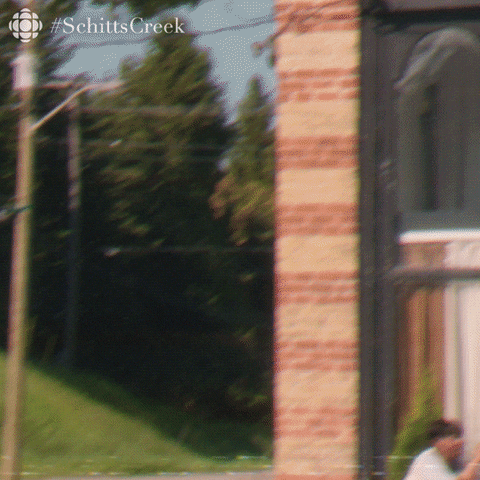
And so for now, even as I am thrilled with the new places to which my healing journey is leading, I am trying to carve out space to feel all the feelings, including grief, as they visit me. I remind myself that it’s there not because I’ve done anything wrong, but rather because I feel so connected to what young Alisa had to go through, and I need to honor the totality of it, grief and all.
